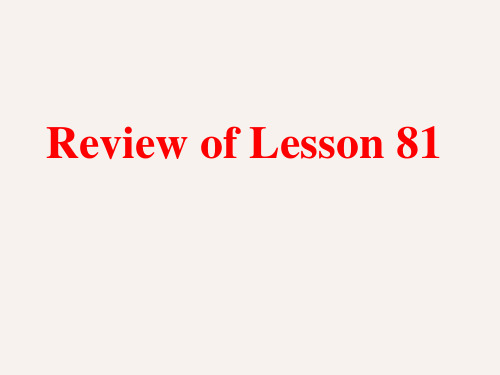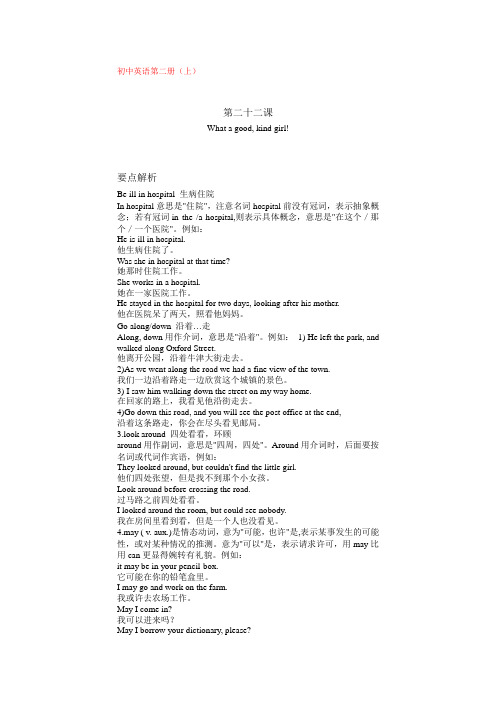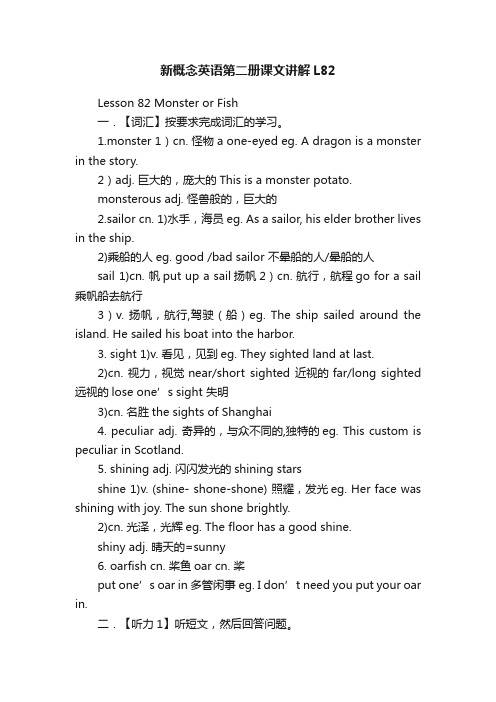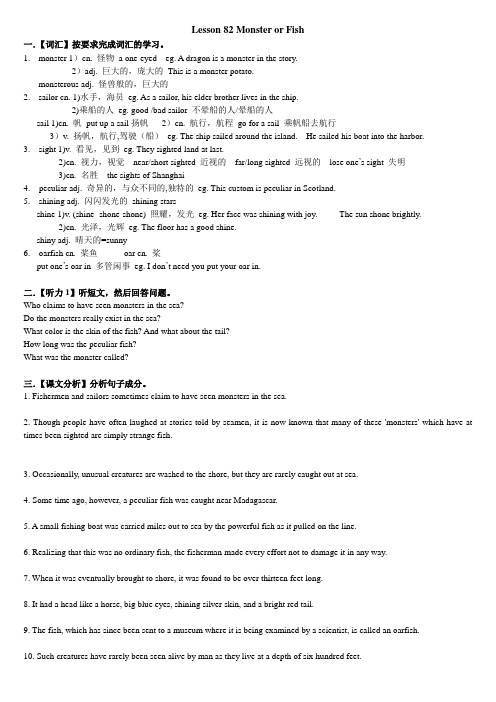初中英语课本第二册(1982年版)
(美音版)新概念英语第二册:Lesson 82 Monster or fish?

(美音版)新概念英语第二册:Lesson 82 Monsteror fish?Lesson 82 Monster or fish?是妖还是鱼?First listen and then answer the question.听录音,然后回答以下问题。
What was the monster called?Fishermen and sailors sometimes claim to have seen monsters in the sea.渔夫和水手们有时声称自己看到过海里的妖怪。
Though people have often laughed at stories told by seamen,虽然人们常常对水手们讲的故事付诸一笑,it is now known that many of these 'monsters' which have at times been sighted are simply strange fish.但现在看来,人们有时看到的这些“妖怪”很多不过是些奇怪的鱼。
Occasionally, unusual creatures are washed to the shore, but they are rarely caught out at sea.一些异常的生物偶尔会被冲到岸上来,但它们在海上却极少能被捕到。
Some time ago, however, a peculiar fish was caught near Madagascar.不过不久前,在马达加斯加附近的海里却捕到了一条奇怪的鱼。
A small fishing boat was carried miles out to sea by the powerful fish as it pulled on the line.一条小渔船被一条咬住钩的强壮的大鱼拖到了几英里以外的海面上。
新概念英语第二册 lesson 82 综合性课件

Yeti
You might run into a Yeti in the Himalayas, or just see a few footprints, if you are lucky!
half-man and half-beast
[ə'bɒm(ə)nəb(ə)l] adj. 讨厌的;令人憎恶的;糟透的
According to some witnesses, it is colorless and it moves at a slow, steady speed with little noise.
A spaceship from another planet ? A satellite? A weather balloon? Can’t tell? That’s why it is called ahe early time
one of the planet's great mysteries
李湘 Candy
Crop circle in the late time
They are becoming more and more complex.
What’s the crop circle ?
sharp blow drive off
Lead in
Brainstorming questions: Have you heard of something not only
interesting and attractive but also unexplained in the world ?
拖进 在黑暗中 换衣服 穿着蓝色制服 肩扛步枪 来回,前后 到处 就在那时 在…停下来 立正 感到惋惜/难过 将某人重击倒在地 开走
初中英语第二册(上)

初中英语第二册(上)第二十二课What a good, kind girl!要点解析Be ill in hospital 生病住院In hospital意思是"住院",注意名词hospital前没有冠词,表示抽象概念;若有冠词in the /a hospital,则表示具体概念,意思是"在这个/那个/一个医院"。
例如:He is ill in hospital.他生病住院了。
Was she in hospital at that time?她那时住院工作。
She works in a hospital.她在一家医院工作。
He stayed in the hospital for two days, looking after his mother.他在医院呆了两天,照看他妈妈。
Go along/down 沿着…走Along, down用作介词,意思是"沿着"。
例如:1) He left the park, and walked along Oxford Street.他离开公园,沿着牛津大街走去。
2)As we went along the road we had a fine view of the town.我们一边沿着路走一边欣赏这个城镇的景色。
3) I saw him walking down the street on my way home.在回家的路上,我看见他沿街走去。
4)Go down this road, and you will see the post office at the end,沿着这条路走,你会在尽头看见邮局。
3.look around 四处看看,环顾around用作副词,意思是"四周,四处"。
Around用介词时,后面要按名词或代词作宾语,例如:They looked around, but couldn't find the little girl.他们四处张望,但是找不到那个小女孩。
初中英语课本第二册(1982年版)

初中英语课本第二册LESSON 3DRILLS〔句型练习〕AWhat’s in the room? There’s a table.Are there any bowls on the table? Yes, there are.And there are some plates, too.BWhat’s on the two plates? There’s some fish on one plate.There’s some bread on the other.What’s in the bowls? There’s some meat in this one.There isn’t any meat in that one. There’s some rice in it.CWhat’s in those glasses? There’s some water in them.Please pass me a glass of water. Here you are.What’s in these cups? There’s some tea in them.Please give him a cup of tea. All right.DAre there any cups on the table? Yes, there are.Is there any tea in that blue cup? Yes, there is.Is there any tea in that green one? No, there isn’t. There’s some milk in it. DIALOGUE〔对话〕SUPPER IS READYMum: Lingling!Ling: Yes, Mum?Mum: Supper is ready.Ling: All right.Dad: Hurry!Mum: Sit down. Lingling. Here’s your rice.Ling: Thanks. Oh, there’s fish and chicken! Meat too!And eggs!Why so much, Mum?Mum: It’s your daddy’s birthday.Ling: Oh! Happy birthday, Dad!Dad: Thank you, Lingling. Help yourself to some fish.Ling: Thank you.GRAMMAR〔语法〕可数和不可数名词〔Countable and Uncontable Nouns〕,英语名词分可数名词和不可数名词两类。
新概念英语第二册第82课-Monster or fish-

新概念英语第二册第82课:Monster or fish?Lesson 82 Monster or fish?是妖还是鱼? First listen and then answer the question.听录音,然后回答以下问题。
What was the monster called?Fishermen and sailors sometimes claim to have seen monsters in the sea. Though people have often laughed at stories told by seamen, it is now known that many of these 'monsters' which have at times been sighted are simply strange fish. Occasionally, unusual creatures are washed to the shore, but they are rarely caught out at sea. Some time ago, however, a peculiar fish was caught near Madagascar. A small fishing boat was carried miles out to sea by the powerful fish as it pulled on the line. Realizing that this was no ordinary fish, the fisherman made every effort not to damage it in any way. When it was eventually brought to shore, it was found to be over thirteen feet long. It had a head like a horse, big blue eyes, shining silver skin, and a bright red tail. The fish, which has since been sent to a museum where it is being examined by a scientist, is called an oarfish. Such creatures have rarely been seen alive by man as they live at a depth of six hundred feet.参考译文渔夫和水手们有时声称自己看到过海里的妖怪。
新概念英语第二册课文讲解L82

新概念英语第二册课文讲解L82Lesson 82 Monster or Fish一.【词汇】按要求完成词汇的学习。
1.monster 1)cn. 怪物a one-eyed eg. A dragon is a monster in the story.2)adj. 巨大的,庞大的This is a monster potato.monsterous adj. 怪兽般的,巨大的2.sailor cn. 1)水手,海员eg. As a sailor, his elder brother lives in the ship.2)乘船的人eg. good /bad sailor 不晕船的人/晕船的人sail 1)cn. 帆put up a sail扬帆2)cn. 航行,航程go for a sail 乘帆船去航行3)v. 扬帆,航行,驾驶(船)eg. The ship sailed around the island. He sailed his boat into the harbor.3. sight 1)v. 看见,见到eg. They sighted land at last.2)cn. 视力,视觉near/short sighted 近视的far/long sighted 远视的lose one’s sight 失明3)cn. 名胜the sights of Shanghai4. peculiar adj. 奇异的,与众不同的,独特的eg. This custom is peculiar in Scotland.5. shining adj. 闪闪发光的shining starsshine 1)v. (shine- shone-shone) 照耀,发光eg. Her face was shining with joy. The sun shone brightly.2)cn. 光泽,光辉eg. The floor has a good shine.shiny adj. 晴天的=sunny6. oarfish cn. 桨鱼oar cn. 桨put one’s oar in 多管闲事eg. I don’t need you put your oar in.二.【听力1】听短文,然后回答问题。
初中英语课本第一册(1982年版)

初中英语课本第一册LESSON 1Letters: A B C D E F G Words: face, bag, bee, bedLESSON 2Letters: H I J K L M N Words: bike, chick, cake, handLESSON 3Letters: O P Q R S T Words: rose, dog, jeep, pen, knife, shipLESSON 4Letters: U V W X Y ZWords: student, bus, plane, apple, sheep, egg, coat, orangeLESSON 6DRILLS(句型练习)AThis is a book. That’This is a pen. That’s a chair.BWhat’s this? It’ a cake.What’s that? It’s an egg.What’s that? It’s an orange.LESSON 7DRILLS(句型练习)AWhat’s this? It’s a bus. It’s a red bus.What’s that? It’s a car. It’s a blue car.BIs this a jeep? Yes, it is. Is it green? Yes, it is.CIs this a ship? Yes, it is. What colour is it? It’s yellow.Is that a plane? Yes, it is. What colour is it? It’s white.DIALOGUE(对话)A:What colour is this apple?B:It’s red.A:What colour is that banana?B:It’s yellow.A:What colour is an orange?B:Why, it’s orange. An orange is orangeLESSON 8DRILLS(句型练习)AThis is my cup. It isn’t your cup. My cup is white. Your cup is yellow. That isn’t his bike. It’Her bike is green.Is this your desk? Yes, it is. Is that your chair? No, it isn’t. It’s his chair. Is this your rubber? Yes, it is. Is that your ruler? No, it isn’t. It’s her ruler. DIALOGUE(对话)Tom:Kate!Kate:Yes?Tom:Is this your knife?Kate:No, it isn’t.* * *Kate:Tom! Is this your pencil-box?Tom:Yes, it is. Thank you.Kate:That’s all right.LESSON 9DRILLS(句型练习)Aone ship; two ships; three cakes; four coats; five beds;six bees; seven bananas; eight oranges; nine buses; ten boxes;BThese are apples. Those aren’t apples. They’re oranges.The apples are here.These are desks.The desks are here. The tables are there.DIALOGUE(对话)A:Look,what’s this?B:It’s a ship.A:No,it’s a sheep. These are all sheep. They’re white sheep. What are those? B:Why, they’re sheep, too. They’re black sheep.A:No, they aren’t sheep. They’re goats.GRAMMAR(语法)名词的复数形式(The Plural Number of Nouns)(Ⅰ)1、一般在单数名词末尾加-s:book-----books ruler-----rulers egg-----eggs student-----students hand-----hands rose-----roses orange-----oranges2、以s、x等结尾的词加-es:bus-----buses box-----boxes注:knife的复数形式为knives,sheep的复数形式和单数形式相同。
新概念英语第二册课文讲解 L82

Lesson 82 Monster or Fish一.【词汇】按要求完成词汇的学习。
1.monster 1)cn. 怪物a one-eyed eg. A dragon is a monster in the story.2)adj. 巨大的,庞大的This is a monster potato.monsterous adj. 怪兽般的,巨大的2.sailor cn. 1)水手,海员eg. As a sailor, his elder brother lives in the ship.2)乘船的人eg. good /bad sailor 不晕船的人/晕船的人sail 1)cn. 帆put up a sail扬帆2)cn. 航行,航程go for a sail 乘帆船去航行3)v. 扬帆,航行,驾驶(船)eg. The ship sailed around the island. He sailed his boat into the harbor.3. sight 1)v. 看见,见到eg. They sighted land at last.2)cn. 视力,视觉near/short sighted 近视的far/long sighted 远视的lose one’s sight 失明3)cn. 名胜the sights of Shanghai4. peculiar adj. 奇异的,与众不同的,独特的eg. This custom is peculiar in Scotland.5. shining adj. 闪闪发光的shining starsshine 1)v. (shine- shone-shone) 照耀,发光eg. Her face was shining with joy. The sun shone brightly.2)cn. 光泽,光辉eg. The floor has a good shine.shiny adj. 晴天的=sunny6. oarfish cn. 桨鱼oar cn. 桨put one’s oar in 多管闲事eg. I don’t need you put your oar in.二.【听力1】听短文,然后回答问题。
- 1、下载文档前请自行甄别文档内容的完整性,平台不提供额外的编辑、内容补充、找答案等附加服务。
- 2、"仅部分预览"的文档,不可在线预览部分如存在完整性等问题,可反馈申请退款(可完整预览的文档不适用该条件!)。
- 3、如文档侵犯您的权益,请联系客服反馈,我们会尽快为您处理(人工客服工作时间:9:00-18:30)。
初中英语课本第二册LESSON 3DRILLS(句型练习)AWhat’s in the room? There’s a table.Are there any bowls on the table? Yes, there are.And there are some plates, too.BWhat’s on the two plates? There’s some fish on one plate.There’s some bread on the other.What’s in the bowls? There’s some meat in this one.There isn’t any meat in that one. There’s some rice in it.CWhat’s in those glasses? There’s some water in them.Please pass me a glass of water. Here you are.What’s in these cups? There’s some tea in them.Please give him a cup of tea. All right.DAre there any cups on the table? Yes, there are.Is there any tea in that blue cup? Yes, there is.Is there any tea in that green one? No, there isn’t. There’s some milk in it. DIALOGUE(对话)SUPPER IS READYMum: Lingling!Ling: Yes, Mum?Mum: Supper is ready.Ling: All right.Dad: Hurry!Ling: I’m coming. Hello, Dad. Hello, Mum.Mum: Sit down. Lingling. Here’s your rice.Ling: Thanks. Oh, there’s fish and chicken! Meat too!And eggs!Why so much, Mum?Mum: It’s your daddy’s birthday.Ling: Oh! Happy birthday, Dad!Dad: Thank you, Lingling. Help yourself to some fish.Ling: Thank you.GRAMMAR(语法)可数和不可数名词(Countable and Uncontable Nouns),英语名词分可数名词和不可数名词两类。
1、可数名词有复数形式,如:an apple two applesa book three booksa car some cars2、不可数名词一般没有复数形式,如:water: a glass of watertwo glasses of watersome waterrice a bowl of ricetwo bowls of ricesome riceLESSON 4DRILLS(句型练习)AWe have a TV set. Have you a TV set?No, we haven’t.Tom has a story-book. Has Jack a story-book, too? No, he hasn’t.He has some picture-books.Have you any ink? Yes, I have some. Give me some ink, please.Here you are. Thank you.DHas Mary any paper? No, she hasn’t.Pass her a piece of paper, please. All right.TEXT(课文)WHAT IS IT?I have a good friend. It has a round face. On its face, it has three hands. One is short, the other two are long. It has no arms, but its hands turn round and round. It has no feet or legs, but it can go all day and all night.It has no eyes and no ears. It has no mouth, but it can talk. In the morning it can wake me up and tell me, “It ’s time to get up.”What is it?GRAMMAR (语法)动词have(verb to have)1、I haveWeYou have You have(not) …He (not) … TheyShe hasIt2LESSON 6DRILLS (句型练习)AIs this new shirt mine? No. It ’s your father ’s. Oh, it ’s his.Is that one mine? Yes, that ’s yours.BWhose jacket is this? It ’s Kate ’s. Oh, it ’s hers.Which one is yours? The white one.CIs this room yours? No. It ’s Mike and John ’s. Oh, It ’s theirs.Which one is yours? The next one is ours.DAre these cups yours? Only some of them.Which ones are yours? The blue ones are ours.DIALOGUE (对话)TWO YOUNG PIONEERSLiu: Look, Zhang Ling. What ’s that? It ’s a watch, isn ’t it?Zhang: Yes. What a nice watch!Liu: It’s quite new!Zhang: Look, there’s a man over there. Perhaps it’s his.Liu: Let’s go and ask him.Zhang: All right.Liu: Excuse me, comrade. Is this watch yours?Man: No, it’s not mine.(they see a woman nearby)Liu: Excuse me, is this watch yours?Woman: No, it isn’t.Zhang: Let’s go and give it to the policeman.Liu: OK.(they go to a policeman nearby)Zhang: Excuse me.Policeman: Yes? Can I help you?Liu: Here’s a watch. We can’t find the owner. Can you find him and give it to him?Policeman: Certainly. Thank you. You’re good Young Pioneers. GRAMMAR(语法)LESSON 7DRILLS(句型练习)AI’m talking. You aren’t talking. You’re listening to me.We’re reading now. Tom and Mike aren’t reading. They’re doing exercises. Rose is writing. Jack isn’t writing. He’s looking out of the windowBClose the door please, Alice.What are you doing, Alice? I’m closing the door.Open the window please, Alice!What’s she doing, Peter? She’s opening the window.CRead the text please, Joan and Rose.What are they doing? They’re reading the text.Write down the new words, please.What are you doing? We’re writing down the new words.TEXT(课文)ON A BUSIt is Sunday today. Wang Lin and Li Ping are going to the zoo. They are waiting for a bus.A red bus is stopping at the bus stop. Wang Lin and Li Ping are getting on the bus.“Here’s a seat for you, Wang Lin.”“No, thank you. There’s another seat. I can sit over there.”The bus is coming to the next stop. Now, an old woman is getting on the bus. Wang Lin and Li Ping both stand up. Li Ping is saying:“Here’s a seat for you, Granny. Please sit here.”Wang Lin is also saying:“Please come here and have my seat, Granny.”“Mine is near the door. So take this seat, please, Granny.”“Thank you very much. It’s very nice of you.”LESSON 8DRILLS(句型练习)AAre you cleaning your classroom? Yes, we are.Are they cleaning their classroom?No, they aren’t. They’re cleaning the dinning-room.BIs Zhang Hong carrying water? Yes, he is.Is Liu Ying cleaning the window?No, she isn’t. She’s cleaning the door.CWho’s taking down the old picture? Our teacher is.Who’s putting up the new ones? Our monitor is.DWho’s sweeping the floor? Some of the boys are.Who’s cleaning the desks and chairs? Some of the girls are.TEXT (课文)PLANTING TREESIt is March now. Spring is here. It is time to plant trees.Look! There ’s a little child in front of the house. What is she doing? She is watering some flowers. Who are the man and the woman beside the house? They are the girl ’s parent. What are they doing? They are planting trees.Look at the children near the river. They are Young Pioneers. Are they playing or working? They are working. They are planting apple trees. Some are digging, some are planting. Some are carrying water, others are watering the trees. All of the children are busy.On the hill there are also a lot of people. What are they doing? They are planting trees, too. Look at all the young trees on the hill.How hard all these people are working! They are helping to make our country beautiful.GRAMMAR (语法)现在进行时(The Present Continuous Tense)1、现在进行时表示现在正在进行或发生的动作。
